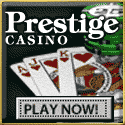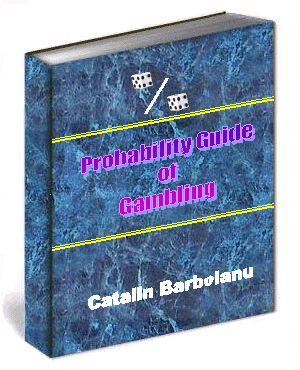Play
To Win
Tips and strategies to help make you a winning casino player Game
Rules
Learn: Blackjack, Baccarat, Craps, Roulette, Slots, Video Poker, Pai Gow Poker,
Texas Hold'em, Caribbean Stud, Let It Ride, Casino War, Big Six, Sic Bo (NEW!)
Systems Gallery
Win more, more often with proven betting methods from the systems gallery
Order
Form
A secure on-line order form to purchase products advertised by Let's Talk
Winning.
Playing Online
All about gambling at online casinos. Find out where the best deals are
Best Casino Bonuses - NEW!
The best collection of on-line casino bonuses, where you can
cash $802 on your sign-up.
Links
and Things
Sign our guestbook, refer a friend, link to other gambling sites.
Gambling News - NEW!
Latest Gambling News - updated daily including gambling
articles, joke of the day and a gambling dictionary.
Newsletter
Click above to read the current
edition of our weekly newsletter. Then get your own free subscription right
here. Enter your e-mail address for immediate delivery of an introductory
issue, including a FREE ROULETTE SYSTEM by clicking
here.
Please tell all
your friends about it.
On-Line Forum
Post a gambling question or opinion - get an answer .
. .
Below is a selection of the most
recommended
on-line casinos
and sportsbooks

Check out:
On-Line Casino of the Month





 




 

|
================================================
Thursday, February 19, 2004
Probability Guide of Gambling by
Catalin Barboianu
Hello
everyone,
I would like to introduce you this week
to an author who has done very extensive work on probability based
strategies. His name is Catalin Barboianu and following is his article
on the subject:
Probability Theory is the only rigorous
theory modeling hazard, so any gambling strategy must be probability based.
This statement is the subject of my article below, which is also part of my
last book, "Probability Guide of Gambling". This guide holds a large
collection of probability results and strategies, covering thousands of
gaming situations from all major games including dice, slots, baccarat,
roulette, blackjack, poker, electronic poker, lottery and sports bets.
It is not a classical scientific study, but a manifold application in
'practical guide' form. It is structured so gamblers with minimal
mathematical background can skip the mathematical parts and directly find
the results they need.
In this guide, the presented numerical
results are accompanied where considered necessary by recommendations to
choose certain gaming variants or even certain games. These recommendations
are built on the 'probability based strategy' and are stated within the
context of the personal criteria of each player, regarding the goal of the
game, the process of game and the player's risk profile.
What does a probability based strategy actually mean?
"A strategy using criteria of evaluation and comparison of probabilities of
various gaming events, in making decisions for accomplishing the proposed
goal", might do for a general definition.
In most cases the declared goal of the gambler is immediate winning of cash,
but also fun, entertainment or experiencing certain emotions that are
specific to competition or risk might be his or her goals.
Here we will show why the probability based strategy is optimal in
situations where the goal of the player is the winning cash. As we said, a
probability based strategy is using decisions made as result of evaluating
the probability figures. These are decisions such as making a particular
playing decision at a certain moment of the game and also of choosing a
certain game to begin with.
Probability Theory is the only rigorous theory that models the hazard. But
it only offers measurements of this hazard and not certainties about
punctual events. The certainty offered by the "Law of Large Numbers" (see
page 35 of my book) is one of the limit, approximation and existence type.
This theorem does not provide precise information about occurrence of
expected events (for example, it cannot tell how many times we have to throw
a die to surely get a 5), but even the limit behavior gives additional
information.
The basic element of probability based strategy is choosing the gaming
variant that offers the highest probability of occurrence of expected event,
in condition of identical ulterior advantages. Assume that the player has
reached a decision situation, at a certain game. His or her options are the
gaming variants A and B, both providing the same ulterior advantages, in
case of occurrence of expected event.
Why is it good for the player to choose the gaming variant that offers the
higher probability of expected event, as long as Probability Theory does not
provide him or her any certainty about it? If we answer this question, the
choice of probability based strategy as being optimal will be justified.
Let's denote by P(A) the probability of occurrence of expected event in
experiment A (playing variant A) and by P(B) the probability of occurrence
of expected event in experiment B (playing variant B) and assume that P(A)>
P(B). We will first provide a motivation for choosing the gaming variant A,
in case the gambler is a regular player of this game.
Let's come back to the "Law of Large Numbers". This theorem states that, in
a sequence of independent experiments, the relative frequency of occurrence
of a certain event is converging towards the probability of that event.
Let's consider experiment A as being part of a sequence of experiments,
namely the sequence of experiments of playing variant A by the same gambler,
at the same type of game, every time he or she reaches that respective
situation (in ulterior games).
Similarly, let's consider experiment B as being part of the sequence of
analogue experiments where the gambler chooses variant B (hypothetically).
Let's denote by a(n) the number of occurrences of expected event after n
experiments of A type and by b(n) the number of occurrences of expected
event after n experiments of B type.
We will show that a sufficiently big number N exists, such that a(n) > b(n),
for any n > N. The demonstration is obvious: We assume the opposite, namely
that for any N, exists n > N such that a(n) < b(n) or a(n) = b(n). In the
same conditions, results a(n)/n < b(n)/n or a(n)/n = b(n)/n. By passing to
the limit in this inequality and using the law of large numbers (a(n)/n
à
P(A), b(n)/n
à P(B)), we get that P(A) < P(B) or P(A) = P(B) and that is
false (we initially assumed that P(A) > P(B)). Therefore, a(n) > b(n) from a
certain rank upward, within the sequence of experiments. This means that the
number of favorable events will be bigger (cumulatively) in case of sequence
of experiments of A type, from a certain rank upward.
Although no mathematical result establishes which this number N is (we only
know it exists), the above demonstration is offering a motivation (purely
theoretical) for choosing the gaming variant A, namely the following: "We
know there is a level N from which the cumulative number of favorable events
is bigger in the situation of a sequence of experiments of A type. If we
"alter" this sequence by introducing experiments of B type, the fulfillment
of the N experiments will be delayed."
This is the only theoretical motivation that uses probability properties.
Because we do not have information about N, which can be any size and
eventually never reached, the motivation remains a theoretical one and might
have no practical coverage, except the cases in which the difference P(A) -
P(B) is significant.
Despite all these, it remains a motivation that justifies the choice of
probability based strategy. But how do we justify the choice of probability
based strategy in a situation where the gambler is not a regular player of
the particular game, he or she plays it only once so the time tendency is
not a motivation any more?
We have here a punctual gaming situation, in which the gambler has to make a
decision to choose one of variants A and B, in a condition of identical
ulterior advantages. Why should he or she choose variant A, which offers a
higher probability for the expected event?
(A similar situation, not apparently related to gambling, is the following:)
You are in a phone box and you must urgently communicate important
information to one of your neighbors. (Let's say you left your front door
open).
You have only one coin, so you can make one single call.
You have two neighboring houses.
Two persons are living in one of them and three persons are living in the
other.
Both their telephones have answering machines.
Which one of the two numbers will you call? Isn't it true that you "feel"
that you must choose the house with 3 persons, because the probability for
someone to be at home is higher? But how do we rigorously explain this
optimal choice, based on probability criteria? Coming back to the assumed
gaming situation, the "Law of Large Numbers" will still provide us a
theoretical motivation for the choice.
Although we don't have here a sequence of tangible experiments, not even
expected ones (as in the regular player case) to include respective
experiment, we still can introduce it in such a sequence, so as for
application of the "Law of Large Numbers" to be available.
Let's consider the sequence of independent experiments of all experiments of
A type performed in time by other players, in the same gaming situation,
chronologically, until the respective gaming moment. Similarly, let's
consider the sequence of experiments of B type, chronologically performed
until the respective moment.
For the two previously defined sequences of experiments we can do the same
deduction as in the first case (regular player), based on the law of large
numbers, and the result will be: a sufficiently big number N of experiments
exists, such that for any n > N, we have a(n) > b(n) or a(n) = b(n).
Therefore, the motivation of "not altering" the sequence of experiments of A
type still stands valid, even if only at the theoretic level.
So, the answer to the question generated by the your required choice is the
following: "Although we don't know where the rank N (provided by the law of
large numbers) is standing and also if experiment A offers a favorable
result, it is proper to choose the gaming variant A at least for the reason
of other eventual ulterior similar gaming situations to form an "unaltered"
sequence of experiments of A type."
As we said, the motivation is a purely theoretical one, but it accomplishes
the proposed goal, namely to show that the probability based strategy is
optimal. The above presented situation of an isolated game has a much
smaller practical coverage than in the case of a regular player, except the
cases in which the difference P(A) - P(B) is big enough. The entire
demonstration above was done in a theoretical situation where the favorable
event expected after each gaming variant offers the same advantage to the
player. This advantage could be the immediate winning of cash, a superior
position in the game, or other strategic advantages.
A probability based strategy can be seen as optimal only after taking into
account the player's goals and these could be various. Thus, the probability
criteria do not always determine decisions, but also the personal and
subjective criteria of the player.
As is well known, probabilities do not provide certainties about hazard. The
probability based strategy is optimal, but it still does not guarantee
winning. In other words, such a strategy is the optimum strategy to adopt
when trying to "push your luck", but it does not bring you luck made to
order.
Although the probability of getting 1 after one die throw is 1/6, if we
throw the die 6 times, this does not assure us getting a 1, just as throwing
the die 10 times does not assure it. Theoretically, is possible to throw the
die 1,000 times and not get a single 1, although it is improbable. The only
thing we know for sure is that the frequency of occurrences of 1 is getting
closer to 1/6, as the number of throws increases.
There is an obvious difference between the terms "possible" and "probable".
Probability is a measure, mathematically rigorously defined, whereas
"possible" is a much more complex and difficult to define philosophical
category. Probability is modeling a minute part of the possible.
A hypothetical rigorous definition of "possible" should include another
"zero degree" philosophical term, namely the reality. This dimension
difference between the two terms is the most relevant expression of the fact
that we cannot rule over the hazard, but we can "push our luck" by using the
laws of probability, even if this often results in losses.
|
Structure of
"Probability Guide of Gambling" |
|
|
|
|
|
|
| |
|
|
|
|
|
|
|
|
|
|
|
|
|
|
|
|
|
|
|
|
|
|
|
|
| |
|
|
|
|
| |
where trying to
familiarize the reader with concept of probability and its
psychological interaction with man in daily life; examples of
situations where probability-based decisions are required and
examples in which common intuition of evaluating probabilities
plays bad tricks; |
|
|
|
|
|
|
|
|
|
|
|
|
|
 |
|
|
| |
|
|
|
| |
|
|
|
|
| |
|
|
|
|
| |
for readers with
minimal mathematical background, this chapter presents the
basics of probability theory: definitions, theoretical results
(without demonstration), calculus formulas, all with suggestive
examples attached; other readers can skip it; |
|
|
|
|
|
|
|
|
|
|
|
|
|
 |
|
|
| |
|
|
|
| |
|
|
|
|
|
|
|
|
|
|
|
 |
|
|
|
|
|
|
|
|
| |
is the collection of
numerical results; it holds probabilities corresponding to most
frequent gaming situations; within each section and sub-section,
after description of calculus algorithm, the numerical results
are taken again and directly presented, mostly in value tables,
from where they can be easily picked, according to desired
situation; also includes game description for each section. |
|
|
|
|
|
|
| |
|
|
|
|
| |
Its sections are:
- Dice
- Slots
- Baccarat
- Roulette
- Blackjack
- Poker
- Electronic Poker
- Lottery
- Sport bets |
|
|
|
|
|
|
|
|
|
|
|
 |
|
|
| |
|
|
|
|
|
|
|
|
|
|
|
|
|
|
|
|
|
|
| |
here is
mathematically shown why a probability-based strategy is
optimum; it also contains comments on the difference between
"possible" and "probable". |
|
|
|
|
|
|
| |
|
|
|
| |
The
Probability-based
Strategy
|
|
|
|
|
|
|
|
 |
|
|
| |
|
You can purchase your own electronic
version of this guide by clicking:
https://www.plimus.com/jsp/buynow.jsp?contractId=1633510&referrer=prob1701
Thank you,
Catalin Barboianu

Wishing you all the best,
Until
next week,
Izak
| WOULD YOU LIKE
TO SUBSCRIBE? Click here. |
If you missed any
newsletter, click here for an archive.



|